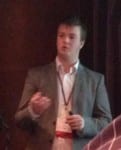by rbartels | Apr 12, 2016 | Publications
We are pleased to announce that FCRG members Dr Hannah Merdian, Dr Nima Moghaddam, and Dr Dave Dawson (in conjunction with numerous other external co-authors) have just had a new paper published in Sexual Abuse: A Journal of Research and Treatment.
Using a sample of 68 offenders, the study had two core goals: (1) to determine whether the offending profile of ‘child sexual exploitation material offenders’ (CSEMOs) is distinct to contact child sexual offenders (CSOs); and (2) to investigate whether distinct subgroups of CSEM users can be empirically differentiated.
Using numerical and spatial methods of data analysis on a variety of clinical and risk-related variables, the results supported the dichotomous distinction between fantasy-driven versus contact-driven CSEM offending. Further analyses identified three dimensions as crucial for the classification of these two subgroups: (a) direct sexual contact with a minor; (b) possession of fantasy-generating material, and (c) social contact with other users that have a sexual interest in minors. This study offers important new insights into the understanding the risks and needs of CSEM users.
Citation: Hannah L. Merdian, Nima Moghaddam, Douglas P. Boer, Nick Wilson, Jo Thakker, Cate Curtis, and Dave Dawson (2016). Fantasy-Driven Versus Contact-Driven Users of Child Sexual Exploitation Material: Offender Classification and Implications for Their Risk Assessment. Sexual Abuse: A Journal of Research and Treatment. doi:10.1177/1079063216641109
by rbartels | Feb 14, 2016 | Conferences / Events
FCRG member and onlinePROTECT (oP) lead Dr Hannah Merdian is proud to announce that the 2016 onlinePROTECT conference is now open for registration. The conference will take place on April 28th at Hamilton House in London.
The conference will address young people and the Internet, considering young people as both victims and perpetrators. The conference will proudly be fundraising for The Lucy Faithfull Foundation; a registered child protection charity which works across the UK to prevent child sexual abuse. The funds raised from this conference will specifically support the Internet Safety Seminars.
Speakers include:
Dr. Elizabeth Letourneau (KEYNOTE) – AssociatePprofessor at John Hopkins University and Director of the Moore Center for the Prevention of Child Sexual Abuse
Jon Brown – Head of Strategy and Development at NSPCC
Dan Callahan – Metropolitan Police Service
Dr Afroditi Pina – Senior Lecturer in Forensic Psychology at University of Kent
Dr Elena Martellozzo – Senior Lecturer in Criminology at Middlesex University
More information about the conference can be found here – http://www.onlineprotectproject.co.uk/2016-conference/
Sign up for the conference is here – http://store.lincoln.ac.uk/browse/product.asp?compid=1&modid=1&catid=468
For regular updates, follow onlinePROTECT on Twitter – @online_PROTECT
by rbartels | Dec 16, 2015 | Publications
FCRG members – Dr. Ross Bartels and Dr. Hannah Merdian – have recently published an article detailing an initial conceptualisation of the implicit theories held by fantasy-driven child sexual exploitation material (CSEM) users. Using a grounded theory approach to analyse the existing literature on CSEM users, Bartels and Merdian propose five CSEM-related implicit theories, each of which is contextualised by a general assumption about the reinforcing nature of the Internet. The five implicit theories include:
Unhappy World (a view that the world is uninterested and/or rejecting – linked to self-regulatory online behaviour)
Self as Uncontrollable (perception of oneself as “addicted” to the online behaviour)
Children as Sex Objects (dehumanising view of children as sexual objects)
Self as Collector (detached perception of CSEM as collectibles)
Nature of Harm (CSEM variant) (denial of role in the abuse cycle and minimisation of harm in CSEM)
.
This paper marks the first published article on this topic and is hoped to be a valuable contribution to the literature.
The article can accessed for free (up until 02/02/16) via this link
by rbartels | Nov 4, 2015 | Conferences / Events
Tomorrow evening (05/11/15), the internet working group – of which FCRG member Dr. Hannah Merdian is a key member – is presenting at a free public engagement event entitled ‘Understanding Sexual Violence and Abuse: Causes, Responses and Prevention’ at the University of the West of England, Bristol. The event is intended to educate and engage the public in the prevention of sexual assault, abuse and exploitation in a non-theoretical and accessible manner.
Brennan, M., Perkins, D., & Merdian, H. L. (2015, November). “We can’t arrest our way out of this.” Managing and preventing online child sexual abuse. Understanding Sexual Violence and Abuse: Causes, Responses, and Prevention. The Watershed, Bristol, UK.
Here is a link to the event: https://info.uwe.ac.uk/events/event.aspx?id=18378
by rbartels | Oct 26, 2015 | Conferences / Events
Recently, a number of FCRG members whose research falls within the field of sexual offending, attended and presented at the 34th annual conference for the Association for the Treatment of Sexual Abusers (ATSA) in Montréal, Canada (14-17th Oct, 2015). Below is a summary of what each FCRG member presented:

Dr Hannah Merdian (alongside Prof. Derek Perkins) ran a pre-conference workshop on case formulation and intervention planning with online child sexual exploitation material (CSEM) users. This comprehensive workshop, based upon recent research and the new onlinePROTECT Pathways Model of CSEM offending, was well attended and highly acclaimed by attendees. Dr Merdian also presented a poster (alongside Dr Bartels) on CSEM implicit theories.
 Prof. Todd Hogue was invited to present in a symposium entitled “Advancing Public Opinion Research on Sexual Violence and Sex Offender Management Policy“. In his talk, Prof. Hogue presented the results of systematic review on measures designed to assess public attitudes towards sex offenders. Reliability and validity results pertaining to the Attitudes Towards Sex Offenders (ATS) scale and Community Attitudes Towards Sex Offenders (CATSO) scale were summarised, as were cross-cultural differences. Issues within existing research were highlighted, and recommendations for future research were proffered.
Prof. Todd Hogue was invited to present in a symposium entitled “Advancing Public Opinion Research on Sexual Violence and Sex Offender Management Policy“. In his talk, Prof. Hogue presented the results of systematic review on measures designed to assess public attitudes towards sex offenders. Reliability and validity results pertaining to the Attitudes Towards Sex Offenders (ATS) scale and Community Attitudes Towards Sex Offenders (CATSO) scale were summarised, as were cross-cultural differences. Issues within existing research were highlighted, and recommendations for future research were proffered.

Craig Harper (PhD Candidate) was invited to provide a ‘blitz talk’ in the same symposium as Prof, Hogue. In this 7-minute presentation, Craig introduced moral disengagement theory as a means for understanding the public’s response to sexual offender cases in the media. Craig then summarised the results of an experimental study that was based upon this theory. The study aimed to test whether dehumanising language (versus factual language) about a sex offender case (embedded within an online newspaper article) would lead the general public to form more negative perceptions of sex offenders. The results were supportive.
 Dr Ross Bartels was invited to partake in a symposium entitled ‘Rape–Supportive Cognition and Sexual Aggression Against Adults‘. Dr Bartels has recently been interested in whether rape-supportive cognitions (or rape myths), held by men, bias memory recall about the actions of a female. For his talk, Dr Bartels presented the results of a preliminary study (carried out by ex-MSc student Rebecca Gentry), based upon prior false memory research, to test this idea. The findings were supportive. Dr Bartels also presented a poster on CSEM-related implicit theories with Dr. Merdian,
Dr Ross Bartels was invited to partake in a symposium entitled ‘Rape–Supportive Cognition and Sexual Aggression Against Adults‘. Dr Bartels has recently been interested in whether rape-supportive cognitions (or rape myths), held by men, bias memory recall about the actions of a female. For his talk, Dr Bartels presented the results of a preliminary study (carried out by ex-MSc student Rebecca Gentry), based upon prior false memory research, to test this idea. The findings were supportive. Dr Bartels also presented a poster on CSEM-related implicit theories with Dr. Merdian,
Overall, the conference was a successful, productive, and inspiring event. Each speaker received positive feedback for their respective presentations, as well as forging some exciting collaborative research opportunities.
If you would like a copy of any of the presentations, please contact the relevant researcher. NB: Clicking the link attached to the researcher’s name will take you to their staff page, where you will find their contact details.




